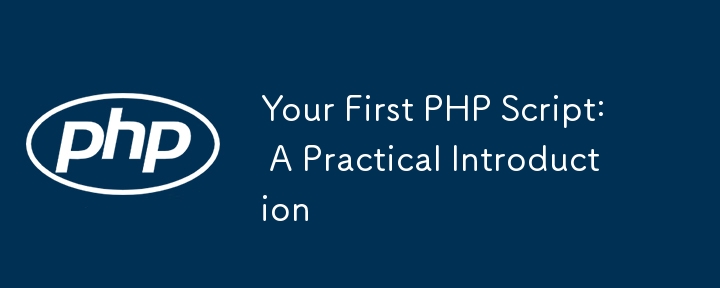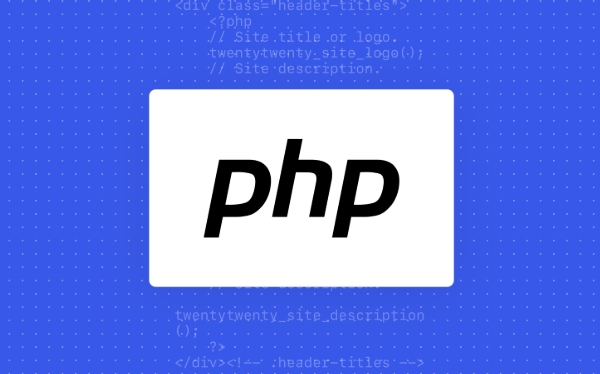Your First PHP Script: A Practical Introduction
Jul 16, 2025 am 03:42 AMHow to start writing your first PHP script? First, set up the local development environment, install XAMPP/MAMP/LAMP, and use a text editor to understand the server's running principle. Secondly, create a file called hello.php, enter the basic code and run the test. Third, learn to use PHP and HTML to achieve dynamic content output. Finally, pay attention to common errors such as missing semicolons, citation issues, and file extension errors, and enable error reporting for debugging.

So you've decided to try writing your first PHP script — good choice. PHP might not be the newest language on the block, but it's still widely used, especially for web development. If you're aiming to build dynamic websites or interact with databases, PHP is a solid tool to have in your kit.

Let's cut to the challenge and walk through what you actually need to get started with your first working PHP script.
Setting Up Your Environment
Before you write any code, make sure your system is ready. PHP runs on a server, so unlike HTML or JavaScript, you can't just open a .php file in your browser and expect it to work.

Here's what you need:
- A local server environment : Tools like XAMPP (Windows/Mac), MAMP (Mac), or LAMP (Linux) let you run PHP locally without needing an actual web host.
- A text editor or IDE : VS Code, Sublime Text, or PHPStorm are popular choices.
- Basic understanding of how servers work : You'll place your PHP files in a specific folder
htdocslikehttp://localhost/your-file.php.
Once installed, test your setup by creating a simple PHP file and loading it in your browser.

Writing Your First Script
Now that your environment is ready, let's write something basic but useful. This script will display a message and show how PHP handles variables and basic logic.
Create a file called hello.php inside your server directory and add this:
<?php $name = "World"; echo "<h1>Hello, $name!</h1>"; ?>
Open your browser and go to http://localhost/hello.php . You should see “Hello, World!” in heading style.
What's happening here:
- The
<?php ... ?>tags tell the server to treat everything inside as PHP code. -
$nameis a variable holding the string"World". -
echooutputs HTML content back to the browser.
This may seem simple, but it demonstrates two key concepts: storing data and outputting it dynamically.
Mixing PHP with HTML
One of PHP's strengths is its ability to seamlessly mix with HTML. You don't have to choose between generating HTML or processing logic — you can do both in the same file.
Here's an example where PHP decides what message to show based on the time of day:
<!DOCTYPE html>
<html>
<head><title>Greeting</title></head>
<body>
<?php
$hour = date('G');
if ($hour < 12) {
echo "<p>Good morning!</p>";
} else {
echo "<p>Hello there!</p>";
}
?>
</body>
</html>This script does a few things:
- Uses
date()to get the current hour. - Checks if it's before noon and displays a different greeting accordingly.
- Outputs HTML from within PHP blocks.
You can switch back and forth between HTML and PHP as needed — just remember to close and reopen the PHP tags properly.
Common Pitfalls and Tips
Even small mistakes can break your script. Here are a few common issues beginners run into:
- Forgetting semicolons at the end of each PHP statement.
- Mixing up quotes and variables — double quotes allow variable interpolation; single quotes don't.
- Not checking error logs — when something doesn't work, look at your server's error log. It often tells you exactly what went wrong.
- Using incorrect file extensions — save files with
.php, not.html.
Also, enable error reporting during development by adding this line at the top of your script:
<?php ini_set('display_errors', 1); error_reporting(E_ALL); ?>
This helps catch mistakes early.
And that's basically it. With these basics down, you're ready to explore more powerful features like forms, databases, and user authentication. It's not complicated, but it does require attention to detail — especially around syntax and server behavior.
The above is the detailed content of Your First PHP Script: A Practical Introduction. For more information, please follow other related articles on the PHP Chinese website!

Hot AI Tools

Undress AI Tool
Undress images for free

Undresser.AI Undress
AI-powered app for creating realistic nude photos

AI Clothes Remover
Online AI tool for removing clothes from photos.

Clothoff.io
AI clothes remover

Video Face Swap
Swap faces in any video effortlessly with our completely free AI face swap tool!

Hot Article

Hot Tools

Notepad++7.3.1
Easy-to-use and free code editor

SublimeText3 Chinese version
Chinese version, very easy to use

Zend Studio 13.0.1
Powerful PHP integrated development environment

Dreamweaver CS6
Visual web development tools

SublimeText3 Mac version
God-level code editing software (SublimeText3)

Hot Topics
 Why We Comment: A PHP Guide
Jul 15, 2025 am 02:48 AM
Why We Comment: A PHP Guide
Jul 15, 2025 am 02:48 AM
PHPhasthreecommentstyles://,#forsingle-lineand/.../formulti-line.Usecommentstoexplainwhycodeexists,notwhatitdoes.MarkTODO/FIXMEitemsanddisablecodetemporarilyduringdebugging.Avoidover-commentingsimplelogic.Writeconcise,grammaticallycorrectcommentsandu
 How to Install PHP on Windows
Jul 15, 2025 am 02:46 AM
How to Install PHP on Windows
Jul 15, 2025 am 02:46 AM
The key steps to install PHP on Windows include: 1. Download the appropriate PHP version and decompress it. It is recommended to use ThreadSafe version with Apache or NonThreadSafe version with Nginx; 2. Configure the php.ini file and rename php.ini-development or php.ini-production to php.ini; 3. Add the PHP path to the system environment variable Path for command line use; 4. Test whether PHP is installed successfully, execute php-v through the command line and run the built-in server to test the parsing capabilities; 5. If you use Apache, you need to configure P in httpd.conf
 PHP Syntax: The Basics
Jul 15, 2025 am 02:46 AM
PHP Syntax: The Basics
Jul 15, 2025 am 02:46 AM
The basic syntax of PHP includes four key points: 1. The PHP tag must be ended, and the use of complete tags is recommended; 2. Echo and print are commonly used for output content, among which echo supports multiple parameters and is more efficient; 3. The annotation methods include //, # and //, to improve code readability; 4. Each statement must end with a semicolon, and spaces and line breaks do not affect execution but affect readability. Mastering these basic rules can help write clear and stable PHP code.
 Your First PHP Script: A Practical Introduction
Jul 16, 2025 am 03:42 AM
Your First PHP Script: A Practical Introduction
Jul 16, 2025 am 03:42 AM
How to start writing your first PHP script? First, set up the local development environment, install XAMPP/MAMP/LAMP, and use a text editor to understand the server's running principle. Secondly, create a file called hello.php, enter the basic code and run the test. Third, learn to use PHP and HTML to achieve dynamic content output. Finally, pay attention to common errors such as missing semicolons, citation issues, and file extension errors, and enable error reports for debugging.
 What is PHP and What is it Used For?
Jul 16, 2025 am 03:45 AM
What is PHP and What is it Used For?
Jul 16, 2025 am 03:45 AM
PHPisaserver-sidescriptinglanguageusedforwebdevelopment,especiallyfordynamicwebsitesandCMSplatformslikeWordPress.Itrunsontheserver,processesdata,interactswithdatabases,andsendsHTMLtobrowsers.Commonusesincludeuserauthentication,e-commerceplatforms,for
 How Do You Handle File Operations (Reading/Writing) in PHP?
Jul 16, 2025 am 03:48 AM
How Do You Handle File Operations (Reading/Writing) in PHP?
Jul 16, 2025 am 03:48 AM
TohandlefileoperationsinPHP,useappropriatefunctionsandmodes.1.Toreadafile,usefile_get_contents()forsmallfilesorfgets()inaloopforline-by-lineprocessing.2.Towritetoafile,usefile_put_contents()forsimplewritesorappendingwiththeFILE_APPENDflag,orfwrite()w
 PHP 8 Installation Guide
Jul 16, 2025 am 03:41 AM
PHP 8 Installation Guide
Jul 16, 2025 am 03:41 AM
The steps to install PHP8 on Ubuntu are: 1. Update the software package list; 2. Install PHP8 and basic components; 3. Check the version to confirm that the installation is successful; 4. Install additional modules as needed. Windows users can download and decompress the ZIP package, then modify the configuration file, enable extensions, and add the path to environment variables. macOS users recommend using Homebrew to install, and perform steps such as adding tap, installing PHP8, setting the default version and verifying the version. Although the installation methods are different under different systems, the process is clear, so you can choose the right method according to the purpose.
 python if else example
Jul 15, 2025 am 02:55 AM
python if else example
Jul 15, 2025 am 02:55 AM
The key to writing Python's ifelse statements is to understand the logical structure and details. 1. The infrastructure is to execute a piece of code if conditions are established, otherwise the else part is executed, else is optional; 2. Multi-condition judgment is implemented with elif, and it is executed sequentially and stopped once it is met; 3. Nested if is used for further subdivision judgment, it is recommended not to exceed two layers; 4. A ternary expression can be used to replace simple ifelse in a simple scenario. Only by paying attention to indentation, conditional order and logical integrity can we write clear and stable judgment codes.






